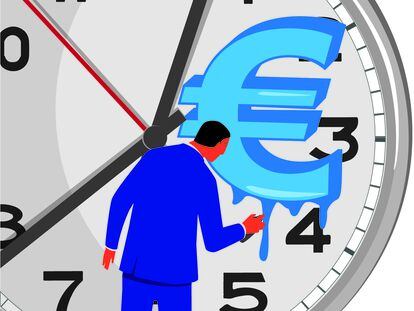The return of the protective state
Resilience is the fashionable economic objective towards which all the world’s economic powers are converging: growth is no longer the only goal

Toni Nadal says that talent can be trained, because talent is the ability to learn and, through learning, to adapt to new circumstances and to solve problems. In this sense, resilience – the ability to overcome traumatic circumstances – is very similar to talent: just think of all the times Rafa Nadal has won impossible points. It is resilience built on talent.
Resilience is the fashionable economic objective, towards which all the world’s economic powers are converging: growth is no longer the only goal, it must be complemented with the reinforcement of national defenses to protect against possible surprises. This summer, Europe created recovery and resilience plans, and reoriented its foreign policy towards strategic autonomy – which as Josep Borrell, the High Representative of the European Union for Foreign Affairs and Security Policy, explains in his blog, is not limited to defense and foreign security, but also includes trade, finance and investment.
China’s dual circulation plan emphasizes the objective of becoming a world leader and self-sufficient in cutting-edge technology sectors. US President-elect Joe Biden has organized his economic strategy around the slogan “Build Back Better,” a play on words between “rebuilding the economy better” and “producing more at home” – and he has made it clear that his priority will be investing in the US and in its workforce. The new Japanese Prime Minister, Yoshihide Suga, has placed strong emphasis on industrial policy and investment in domestic innovation. And the global fragility in the face of Covid-19′s unexpected scare has highlighted, even more if possible, the need to urgently address climate change.
The new economic strategies represent a return to the protective state
The common thread of these policies is accepting that, although sometimes efficiency and resilience may conflict, both are necessary in the right balance. It has been seen clearly with the Covid-19 crisis, in the shortage of medical supplies and dependence on imports and the precariousness of some hospital systems. But also in the recognition that technological progress typically increases inequality, at least initially – and the pandemic has only accelerated the digital revolution – and that the search for efficiency through globalization can have, if adequate compensatory measures are not adopted, negative economic and political effects in certain regions and layers of society.
It is, perhaps, the logical evolution of the Washington Consensus – a consensus that, originally, was just a descriptive list of 10 economic policies that John Williamson, back in 1989, thought could stabilize the Latin American continent after its debt crisis of the 1980s. The context was the disastrous state intervention in the Latin American economies, amplified by the fall of the Berlin Wall and the failure of the communist economic regime. The recommendations were sensible – and certainly much better than the alternative – but, in some cases, their implementation left a lot to be desired. The political background favored in some cases the erroneous simplification of the Washington consensus as just liberalizing, privatizing and minimizing state intervention in the economy. And, where it was pushed to the extreme, the result was the dominance of efficiency over resilience.
The new economic strategies represent a return to the protective state. On the one hand, ironically, derived from the success of the Washington Consensus: the independence of monetary policy and the stabilization of inflation, the rationalization of fiscal policy, and the opening up of trade and capital markets, have reduced economic volatility and risk premia and allowed for greater state intervention – provided it is well designed – to complement what the market cannot provide.
The post-Covid-19 world will favor economies with more talent and resilience
On the other hand, dictated by a context very different from that of the 1990s, with a more balanced global distribution of forces, an integrated Europe but with an increasingly reduced global economic weight due to the aging of its population, China turned into a global economic power with a strong economic diplomacy, and emerging countries more solid and economically independent. Nor should it be assumed that the interests and incentives of the US and Europe will always be aligned: distrust of free trade is widely shared in Washington, and it remains to be seen how the American concept of strategic competition fits with the European concept of strategic autonomy. The primary objective of the world’s economic powers is no longer just multilateralism and globalization, but also inclusive growth at home. The geopolitical geometry is more diffuse and variable, and must be robust to non-cooperative behavior.
The post-Covid-19 world will favor economies with more talent and resilience, with more adaptability and with better productive structures, not only private but also public. The secular fall in interest rates implies that the rate of return on public capital is perhaps higher than that of private capital, and therefore no country can afford to ignore the development of the entrepreneurial state and the improvement of the design and efficiency of public investment and state institutions. Public investment should also be used to catalyze structural improvements that increase the investment multiplier and the productivity of the economy, creating a virtuous cycle. It is time to “pay to reform,” to design public investment projects that help compensate those who endure the cost of the reforms. Saving while others invest in talent can cost dearly. It is the paradox of risk. Happy holidays and a prosperous 2021.
@angelubide


/cloudfront-eu-central-1.images.arcpublishing.com/prisa/WASVBAWZJNGKPBLI64WMDCCX2M.jpg)










































